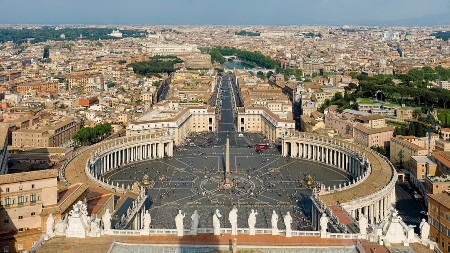We ask you, urgently: don’t scroll past this
Dear readers, Catholic Online was de-platformed by Shopify for our pro-life beliefs. They shut down our Catholic Online, Catholic Online School, Prayer Candles, and Catholic Online Learning Resources—essential faith tools serving over 1.4 million students and millions of families worldwide. Our founders, now in their 70's, just gave their entire life savings to protect this mission. But fewer than 2% of readers donate. If everyone gave just $5, the cost of a coffee, we could rebuild stronger and keep Catholic education free for all. Stand with us in faith. Thank you.Help Now >
Opinion: Obama Economy: With Charity toward None?
FREE Catholic Classes
The Pope has given us the yardstick with which we may measure all of the hoopla surrounding Obama's inauguration.
Highlights
Catholic Online (https://www.catholic.org)
1/22/2009 (1 decade ago)
Published in Politics & Policy
LANGLEY, B.C. (Catholic Online) - "A nation cannot prosper long when it favors only the prosperous," said U.S. President Obama in his inaugual address of January 20, 2009. "The success of our economy has always depended not just on the size of our gross domestic product, but on the reach of our prosperity; on our ability to extend opportunity to every willing heart -- not out of charity, but because it is the surest route to our common good."
At this very odd phrase -- "not out of charity" -- my ears perk up. For Obama's rhetorical contrast is between charity, on the one hand, and justice, on the other hand: namely, social justice, also known as the common good.
I am reminded of Pope Benedict XVI's encyclical, Deus caritas est (translated as "God is love"), which has the world "charity" in its title. Caritas -- "love" -- can also be translated more precisely as "charity" (the love that is most like God).
Benedict writes there of a "particular insistence by Marxism". Marxism insists that, "the poor do not need charity but justice. Works of charity -- almsgiving -- are in effect a way for the rich to shirk their obligation to work for justice and a means of soothing their consciences, while preserving their own status and robbing the poor of their rights."
For this reason, explains the Pope, the Marxist view argues: "Instead of contributing through individual works of charity to maintaining the status quo, we need to build a just social order in which all receive their share of the world's goods and no longer have to depend on charity."
Obama's sharp rhetorical contrast between justice and charity brings to mind the old Marxist argument, with its sharp opposition between justice and charity. "There is admittedly some truth to this argument, but also much that is mistaken," writes Benedict.
Well, what is wrong with it? Where is the mistake? The Pope explains: "In the end, the claim that just social structures would make works of charity superfluous masks a materialist conception of man: the mistaken notion that man can live 'by bread alone'".
But what is right with the argument? Where would the Pope find some truth in Obama's sharp contrast? "The direct duty to work for a just ordering of society," writes Benedict "is proper to the lay faithful. As citizens of the State, they are called to take part in public life in a personal capacity. So they cannot relinquish their participation 'in the many different economic, social, legislative, administrative and cultural areas, which are intended to promote organically and institutionally the common good.'" (And here Benedict is quoting Pope John Paul II on "the common good".)
How, then, could Obama's notion of the common good perhaps differ from Benedict XVI's and John Paul II's?
"The mission of the lay faithful is therefore to configure social life correctly," continues Benedict, "respecting its legitimate autonomy and cooperating with other citizens according to their respective competences and fulfilling their own responsibility. Even if the specific expressions of ecclesial charity [by the Church] can never be confused with the activity of the State, it still remains true that charity must animate the entire lives of the lay faithful and therefore also their political activity, lived as 'social charity'." Charity, in other words, must always animate social charity.
Here, to make the logic of his argument clear, Benedict uses the phrase "social charity" from the Catechism of the Catholic Church, #1939, which begins a section there on the type of "friendship" known as "solidarity", i.e., "the effort for a more just social order" which is "a direct demand of human and Christian brotherhood".
So, Obama's invocation of "the common good", even if he sharply contrasts it with charity, seems to have something in common with Catholic social teaching. There is some truth there.
But where he goes wrong is not to recognize that such "social charity" serving the common good can never make full Christian charity obsolete. Obama's version of "social charity" is not all there is to charity. The Pope explains the distinction between "social charity" and full Christian charity: "Christian charitable activity must be independent of parties and ideologies. It is not a means of changing the world ideologically, and it is not at the service of worldly stratagems, but it is a way of making present here and now the love which man always needs."
Benedict warns, however, that, in our world, many people will think that "social charity" is enough, as if Christian charity were obsolete or, even worse, an obstacle to justice. Many people, therefore, in the name of justice, will want to exclude Christian charity from public life. The "social charity" of such people then becomes tyranny, a gross perversion of true charity.
"The modern age, particularly from the nineteenth century on, has been dominated by various versions of a philosophy of progress whose most radical form is Marxism," writes Benedict. "Part of Marxist strategy is the theory of impoverishment: in a situation of unjust power, it is claimed, anyone who engages in charitable initiatives is actually serving that unjust system, making it appear at least to some extent tolerable. This in turn slows down a potential revolution and thus blocks the struggle for a better world. Seen in this way, charity is rejected and attacked as a means of preserving the status quo. What we have here, though, is really an inhuman philosophy. People of the present are sacrificed to the moloch of the future -- a future whose effective realization is at best doubtful."
With these sobering words, the Pope has given us the yardstick with which we may measure all of the hoopla surrounding Obama's inauguration.
"We remain a young nation, but in the words of Scripture, the time has come to set aside childish things," said Obama in his inaugural speech. But we are left to wonder: Does Obama think that Christian charity is one of those "childish things" that can be left behind? Will the Obama revolution persecute those who bear witness to Christian charity? Will unborn children, marriage founded on human nature, and human dignity, all in turn be sacrificed as Obama unveils to the world his notion of "the common good"?
If so, the social teaching of the Catholic Church has a reminder for Obama, amidst all his priorities, and amidst all his plans for an economy that he thinks will achieve "the common good" -- but "not out of charity". When it comes to hope, to change, to any and all priorities, "the greatest of these is love" (1 Cor 13:13); or, in Latin, caritas: "charity".
----
Dr. C.S. Morrissey teaches Latin and Philosophy at Redeemer Pacific College in Langley, British Columbia.He is a contributing writer for Catholic Online.
---
'Help Give every Student and Teacher FREE resources for a world-class Moral Catholic Education'
Copyright 2021 - Distributed by Catholic Online
Join the Movement
When you sign up below, you don't just join an email list - you're joining an entire movement for Free world class Catholic education.

-

-
Mysteries of the Rosary
-
St. Faustina Kowalska
-
Litany of the Blessed Virgin Mary
-
Saint of the Day for Wednesday, Oct 4th, 2023
-
Popular Saints
-
St. Francis of Assisi
-
Bible
-
Female / Women Saints
-
7 Morning Prayers you need to get your day started with God
-
Litany of the Blessed Virgin Mary
Daily Catholic
 Daily Readings for Thursday, January 16, 2025
Daily Readings for Thursday, January 16, 2025 St. Fursey: Saint of the Day for Thursday, January 16, 2025
St. Fursey: Saint of the Day for Thursday, January 16, 2025 Prayer for a Blessing on the New Year: Prayer of the Day for Tuesday, December 31, 2024
Prayer for a Blessing on the New Year: Prayer of the Day for Tuesday, December 31, 2024- Daily Readings for Wednesday, January 15, 2025
- St. Paul the Hermit: Saint of the Day for Wednesday, January 15, 2025
- St. Theresa of the Child Jesus: Prayer of the Day for Monday, December 30, 2024
![]()
Copyright 2024 Catholic Online. All materials contained on this site, whether written, audible or visual are the exclusive property of Catholic Online and are protected under U.S. and International copyright laws, © Copyright 2024 Catholic Online. Any unauthorized use, without prior written consent of Catholic Online is strictly forbidden and prohibited.
Catholic Online is a Project of Your Catholic Voice Foundation, a Not-for-Profit Corporation. Your Catholic Voice Foundation has been granted a recognition of tax exemption under Section 501(c)(3) of the Internal Revenue Code. Federal Tax Identification Number: 81-0596847. Your gift is tax-deductible as allowed by law.







 Daily Readings for Thursday, January 16, 2025
Daily Readings for Thursday, January 16, 2025 St. Fursey: Saint of the Day for Thursday, January 16, 2025
St. Fursey: Saint of the Day for Thursday, January 16, 2025 Prayer for a Blessing on the New Year: Prayer of the Day for Tuesday, December 31, 2024
Prayer for a Blessing on the New Year: Prayer of the Day for Tuesday, December 31, 2024


